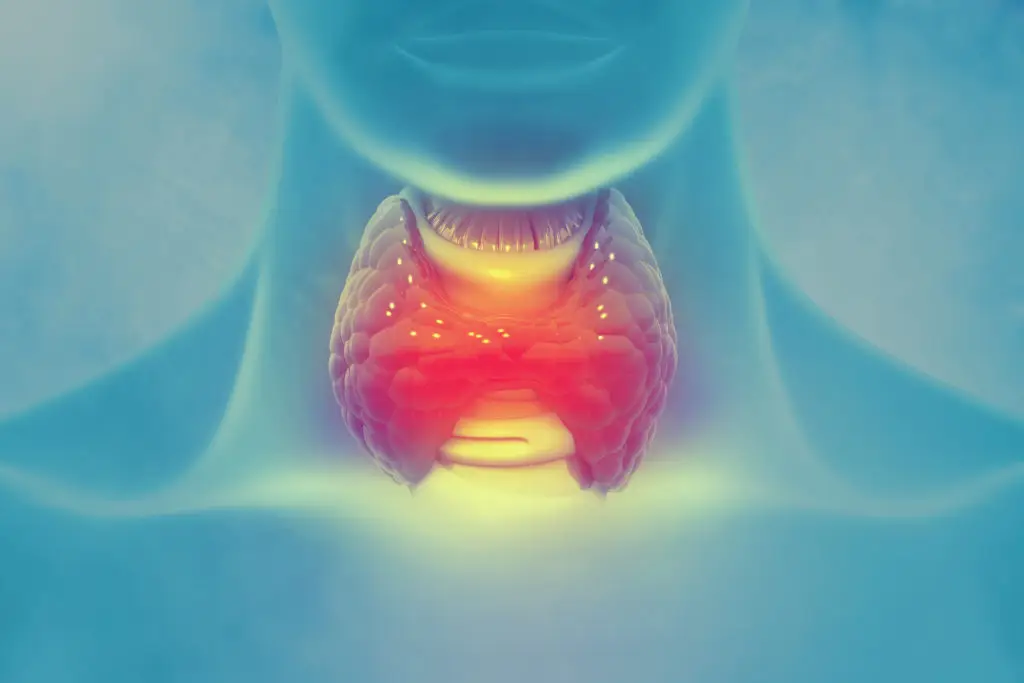Reviewed by Kimberly Cabe, FNP-BC of Forum Health Clarkston
The thyroid gland contributes to almost every function in the body. This butterfly shaped gland located behind the Adam’s apple, releases a hormone that is responsible for regulating the metabolism of every cell in the body.
This effects brain function, cholesterol levels, body temperature, the cardiovascular system, the nervous system and more. This hormone is made up of thyroxin or T4 and triiodothyronine or T3, which is a small portion of T4 converted by the body. The amount of hormone released is dependent on another hormone known as TSH produced by the pituitary gland. Like an interconnected web, the pituitary gland determines the amount of TSH to be released based on the levels of thyroid hormone present in the bloodstream.
A thyroid defect occurs when the amount of hormone released is out of balance causing either hyperthyroid, when too much hormone is produced or hypothyroid when there is not enough hormone. Given the critical role the thyroid has on the body, a thyroid imbalance can be rather noticeable as distinct symptoms begin to surface.
HYPERthyroid Side Effects
- Rapid Heart rate
- Weight loss
- Sensitive to heat
- Anxiety
- Hand Tremors
- Trouble concentrating
- Excessive Sweating
- Insomnia
- Hair loss
HYPOthyroid Side Effects
- Weight Gain
- Fatigue
- Heavy menstrual cycles
- Trouble concentrating
- Hair loss
- Brittle nails
- Raised cholesterol
- Depression
- Fighting Inflammation
Proper nutrition can aid in hormone synthesis such as ensuring that sufficient iodine is present in your diet. However, certain thyroid diseases for example, Hashimoto’s disease, where the body mistakes the thyroid as a foreign body and tries to remove the thyroid, increases inflammation in the process. For this reason, an anti-inflammatory diet is wise to lessen symptoms and improve overall thyroid function.
Inflammatory foods to avoid

- Gluten – Gluten has been the culprit of leaky gut syndrome, hindering nutrient absorption and promoting inflammation. Those with thyroid disease have greater sensitivities to gluten thus the side effects from gluten appear more prominent.
- Dairy – Promotes inflammation
- Sugar – Linked to inflammation, weight gain, fatigue and depression.
- Refined Carbohydrates – Foods such as breads, Pastas, cereal, and enriched flour are linked to weight gain and inflammation.
Supplements to add
- Iodine and Selenium – Most diets have a deficiency in these minerals that play a critical role in thyroid hormone synthesis.
- Coconut oil – An anti-inflammatory agent, promoting healthy digestion and fights fatigue.
- L-tyrosine – 500 mg – Aides in thyroid hormone synthesis as well as a sleep agent that produces melatonin and dopamine that both elevates the mood and improves sleep.
- Ashwagandha– 500 mg twice daily – Improves the body’s response to stress, consequently balancing hormone levels.
- Fish Oil – 1000 mg – The DHA and EPA Omega 3s found in fish aid in lowering cholesterol, improving brain function and decreasing inflammation.
Use nutrition as prevention!
A balanced diet of fruits and vegetables should be a go-to for those battling a thyroid disease as their essential vitamins and minerals naturally counteract the effects of an imbalanced thyroid. While adding certain supplements and eliminating inflammatory foods, a thyroid disease can be naturally managed depending on the severity.
If you suspect you may have an imbalance of thyroid hormone production, Forum Health offers full health-assessments in order to accurately tailor your diet and reverse the effects of hormone imbalance.
Resources
Axe, Josh (2014). Hypothyroidism Diet + Natural Treatment. Retrieved from: https://draxe.com/hypothyroidism-diet-natural-treatment/
Dieffenbach, Sue (2015). Hypothyroidism. Nutrition Digest, Vol. 28. No. 2. Retrieved from: http://americannutritionassociation.org/newsletter/hypothyroidism
Harris, Cheryl (2012, July). Thyroid Disease and Diet – Nutrition Plays a Part in Maintaining Thyroid
Health. Today’s Dietitian, Vol. 14 No. 7. P/ 40. Retrieved from: http://www.todaysdietitian.com/newarchives/070112p40.shtml






